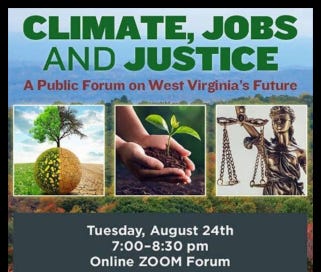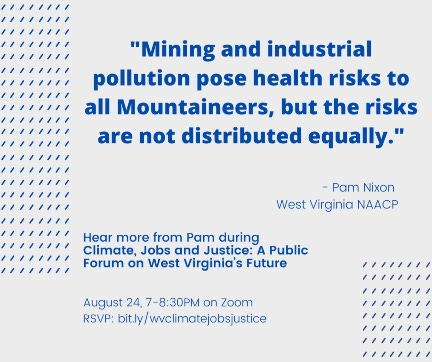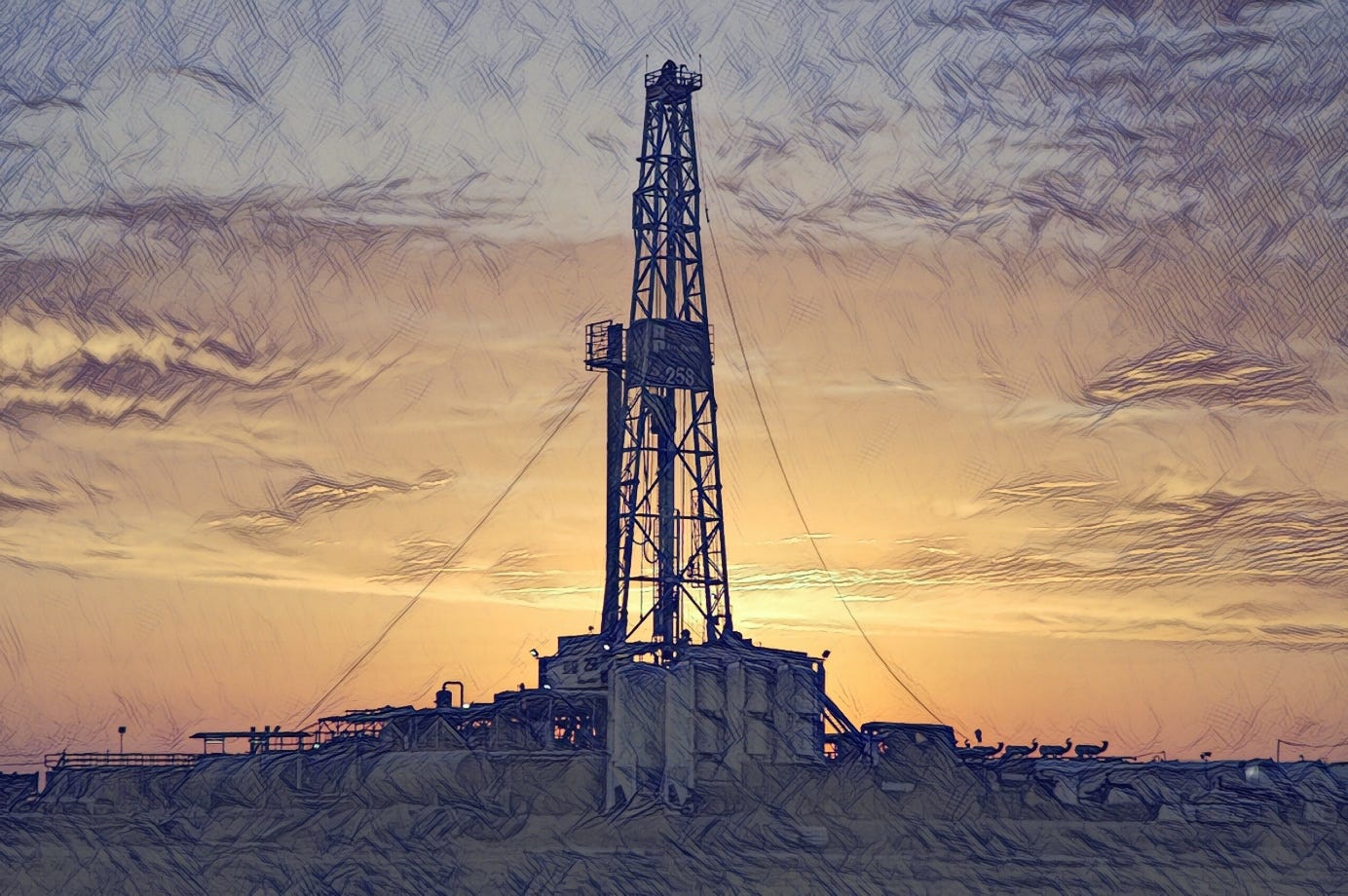Thinking globally & acting locally on the climate
"CLIMATE, JOBS AND JUSTICE" forum in West Virginia sums up the stakes | AUG19.2021
GREETINGS: This ChangingClimateTimes focuses on a Tuesday, Aug. 24 2021 “climate summit” in West Virginia to highlight issues of national and international importance. NOTE: If this newsletter was forwarded to you, free subscribe at: ChangingClimateTimes.substack.com | Be well, Douglas John Imbrogno, Editor
1 | Where climate, jobs and justice meet
To register for the “Climate, Jobs & Justice” Aug. 24 event, go to wvclimatealliance.org/events.
Taking action to address the climate crisis recalls the 1970s adage: “Think globally, act locally.” Yet, you might flip the phrase as connecting local efforts with international climate work is also key: “Think locally, act globally.” The West Virginia Climate Alliance, a new coalition of 20 state and local organizations, is doing just that with the free virtual event “CLIMATE, JOBS AND JUSTICE: A Public Forum on West Virginia’s Future” from 7 to 8:30 p.m. on Tuesday, August 24. Register at this link.
At the forum, local and national leaders will consider the dire risks of unchecked climate change, but also how taking action can benefit the West Virginia economy. I recently began helping the Alliance with its communications effort — below is a sketch of a forum that will appeal not just to West Virginians, but to anyone concerned with environmental justice and the way forward on the climate crisis.
Collin O’Mara, president of the National Wildlife Federation, is a featured speaker at the forum. Climate action must consider the impacts on coal-producing communities. “We are already experiencing more frequent and more intense floods, fires, and droughts that threaten our way of life,” he says. “It is past time for action on climate, but we can neither ask nor expect West Virginia’s coal communities to trade one crisis for another.”
2 | Tackling environmental injustice
Photo by veeterzy on Unsplash
The latest Intergovernmental Panel on Climate Change report, released earlier this month, found that climate change impacts can now be seen in every part of the world, including all regions of America. Yet the report also notes that limiting greenhouse gas emissions will quickly improve air quality. Climate Forum speaker Pam Nixon of the West Virginia NAACP explains that this would have immediate health benefits in West Virginia, where communities with mountaintop removal mines and heavy industry also have high rates of birth defects, cancer, and heart disease.
“Mining and industrial pollution pose health risks to all Mountaineers, but the risks are not distributed equally,” said Nixon. “West Virginians should band together to demand state and federal climate action that will protect our health and interrupt the patterns of environmental injustice that have been harming our residents for more than a century.”
3 | ‘The root of the problem’
Hoeft Marsh, Greenbottom WV | WestVirginiaVille.com photo | january2021
Just like everywhere across the planet, climate change will have drastic impacts on West Virginia’s mountains, rivers and forests, even changing the types of trees able to grow in the state. “In the coming decades, our rivers and drinking water will be increasingly stressed by both droughts and floods,” said Angie Rosser, executive director of West Virginia Rivers who will introduce the Climate Forum. “We need to address the root of the problem while protecting the waters that are essential to our quality of life.”
“We have squandered the time when we could leisurely address the climate crisis,” says West Virginia Climate Alliance co-founder Perry Bryant. “While it’s not too late, we now have to act decisively in order to avert the worst impacts of climate change.”
4 | The Clean Energy Economy
Climate Forum speaker Jeremy Richardson, a senior energy analyst with the Union of Concerned Scientists and author of a joint report with the Utility Workers Union of America, says that moving forward on climate action also means bringing workers along by investing in communities formerly reliant on fossil fuel economy.
“The nation’s energy mix is already shifting away from coal, and that trend is set to continue. Rather than offer false hope, investing in workers and communities that have sacrificed so much to build this country will give them the fighting chance to be part of the clean energy economy that they deserve.”
Forum speaker Sean O’Leary, a senior researcher at the Ohio River Valley Institute, just authored two new reports on the economics of fossil-fuel dependent communities. "With the promise of new federal funding and the emergence of a new model for successful economic development in chronically distressed fossil fuel communities, West Virginia has a rare opportunity to fully participate in and benefit from the nation's transition to a clean energy system,” he says.
5 | The “bad deal” of the natural gas/fracking boom
I wanted to go deeper with Sean O’Leary about the Ohio River Valley Institute’s eye-opening reports, and their thesis that taking climate action will mean not only a better quality of life, but more sustainable employment.
CHANGING CLIMATE TIMES: One important conclusion of your Ohio River Valley Institute reports is that energy efficiency could lead to a better quality of life — and even more sustainable work than the natural gas industry, which so many communities and states have bet upon. Can you elaborate since natural gas/fracking has long been touted as a boon?
SEAN O’ LEARY: As described in the report, a number of factors combine to dilute the local jobs impact and economic value of natural gas investment. But the key one is, that by some measures, the natural gas industry is the least jobs-intensive in the US economy. As little as 10 cents on the dollar invested or earned by the industry goes to pay for labor. And many of the workers and service providers the industry does engage come from places like Texas, Oklahoma, and Louisiana.
By contrast, activities that make up energy efficiency such as HVAC, door and window replacement, and insulation, are among the most jobs-intensive — and those kinds of services are overwhelmingly performed by local contractors and workers, which keeps money circulating in the local economy and creates even more jobs.
Another important factor is that, whereas natural gas extraction causes a variety of negative impacts related to noise, air, and water pollution, and even damage to roads and infrastructure, the impacts of increased energy efficiency are nearly all positive — reduced utility bills, safer and more comfortable homes, schools, and workplaces, better health, and an improved quality of life.
CCT: The reports suggest the natural gas industry is “destined to fail." What do you mean by that?
SEAN O’ LEARY: Many of the problems I mentioned a moment ago are structural. That means they are not in the interest of the industry to change or within the capacity of policymakers to force change. For instance, the industry can't be made to hire more workers than it needs or to source employees and service providers from our region when it already has experienced employees and service providers who happen to live elsewhere, but can easily commute in and out of Appalachia.
Another factor is that, due to low prices for natural gas, the industry is earning far less money from sales than it originally expected. And, of the revenue that is realized, little of it enters local economies in Appalachia. Yet, there is nothing policymakers can do to raise the price of gas or to require folks who receive income from royalties and lease fees to spend their money locally. When you combine those factors with the costs the industry imposes as it grows, you end up on a rat wheel in which costs to the region rise as fast as income — and you can never get ahead.
I tell them, this isn't really about climate change or being pro-fracking or anti-fracking or pro-natural gas or anti natural gas. It's about the fact that financially, economically, we're getting a bad deal. ~ SEAN O’LEARY
CCT: How do you see the challenge of rousing more people to the severity of climate change, especially in a place like West Virginia, which has voted so red in recent years and with a state legislature that seems incapable of even uttering the words 'climate change'? How do you get to the politics of taking action on the climate crisis in Appalachia?
SEAN O’ LEARY: When talking to people who are outside the environmental community, I rarely discuss climate change. I tell them, this isn't really about climate change or being pro-fracking or anti-fracking or pro-natural gas or anti natural gas. It's about the fact that financially, economically, we're getting a bad deal.
Regardless of your political party or your feelings about the environment or even the natural gas industry, no one should be for a bad deal. And, on the flip side, whether or not you believe we need to reduce greenhouse gas emissions, investments in clean energy and energy efficiency make our lives better and deliver real and sustained job growth. The point is that, while you and I might hold environmental values dear, we can also speak powerfully to the values of people who may not.
6 | Before You Go …
For more on the West Virginia Climate Alliance and its member groups, click here. | Subscribe to this newsletter at: changingclimatetimes.substack.com. | Follow us on Twitter at @TimesClimate | Offer feedback below or send suggestions to: douglaseye AT gmail DOT com.
PS | You Promised Climate Cartoons.
I did, way back in ISSUE 1. Here is one by Drew Sheneman, editorial cartoonist for the Star-Ledger. For more of his work, click here.









